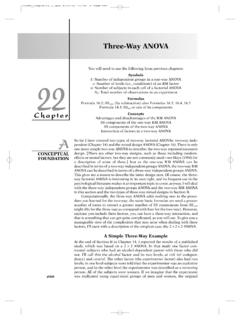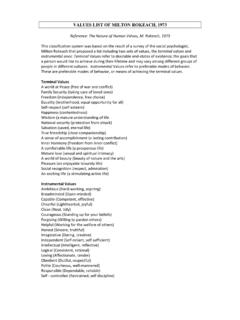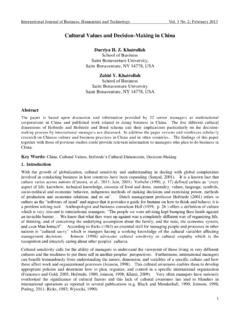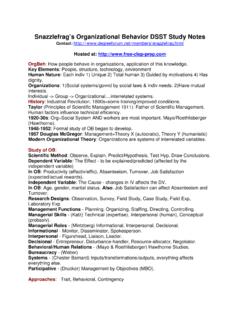Transcription of Liberal and Conservative Values: What We Can Learn From ...
1 Liberal and Conservative Values: what We Can LearnFrom congressional TweetsKevin L. JonesUniversity of California, BerkeleySharareh NoorbaloochiNew York UniversityJohn T. JostNew York UniversityRichard BonneauNew York UniversityJonathan NaglerNew York UniversityJoshua A. TuckerNew York UniversityPast research using self-report questionnaires administered to ordinary citizens demonstrates that valuepriorities differ as a function of one s political ideology, but it is unclear whether this conclusion applies topolitical elites, who are presumably seeking to appeal to very broad constituencies. We used quantitativemethods of textual analysis to investigate value -laden language in a collection of 577,555 messages sent fromthe public Twitter accounts of over 400 members of the Congress between 2012 and 2014.
2 Consistent withtheoretical expectations, we observed that Republican and Conservative legislators stressed values of tradition,conformity, and national security (as well as self-direction), whereas Democratic and Liberal legislatorsstressed values of benevolence, universalism, hedonism, and social/economic security (as well as achievement).Implications for the large-scale observational study of political psychology are WORDS:liberals, conservatives, values, social media, Twitter, LIWC, Schwartz circumplex model, Congress,political elites, federal legislators We hang on to our values, even if they seem at times tarnished and worn; even if, asa nation and in our own lives, we have betrayed them more often than we care toremember.
3 what else is there to guide us? (Barack Obama, 2006,The Audacity of Hope)10162-895 XVC2017 International Society of Political PsychologyPublished by Wiley Periodicals, Inc., 350 Main Street, Malden, MA 02148, USA, 9600 Garsington Road, Oxford, OX4 2DQ,and PO Box 378 Carlton South, 3053 Victoria, AustraliaPolitical Psychology, Vol. xx, No. xx, 2017doi: the fall of 2013, the Democratic and Republican members of Congress failed to agree on a budgetfor the United States of America. Consequently, for the first 16 days of October 2013, 800,000 federalemployees were furloughed, all national parks wereclosed, and million employees were required towork without knowing when they would receive their next paycheck. Citizens expressed bewildermentabout the intransigence and incompetence of their elected representatives.
4 At the same time, members ofCongress used their bully pulpits to blame the other party for failure to compromise. Events such as rou-tine gridlock and threats of governmental shutdowns raise questions about whether there may be underly-ing psychological as well as political differencesbetween liberals and conservatives that impede theirability to work together (see also Krochik & Jost, 2011).A great many studies of ordinary citizens suggest that there are consistent and robust left-rightideological differences in personality, cognitive style, personal values, and neurocognitive structureand function ( , Amodio, Jost, Master, & Yee, 2007; Caprara, Schwartz, Capanna, Vecchione, &Barbaranelli, 2006; Carney, Jost, Gosling, & Potter, 2008; Gerber, Huber, Doherty, Dowling, Hibbing, Smith, & Alford, 2014; Jost, Glaser, Kruglanski, & Sulloway, 2003; Kanai, Freiden,Firth, & Rees, 2011; Piurko, Schwartz, & Davidov, 2011; Tetlock, 1984).
5 Results reveal that those onthe political left tend to prioritizeequalityandsocial justiceand are relatively open to new experien-ces and cognitive complexity. In comparison, those on the political right tend to prioritizetraditionandsocial order, to exhibit a more persistent, sometimes rigid cognitive style, and to be more sensi-tive to uncertainty and threat (Jost, 2006). To wield a metaphor popularized by Max Weber, there areimportant elective affinities between psychological needs, values, and interests and political goals(Jost, Federico, & Napier, 2009). Because those on the left are motivated in the manner of liberalslike John Stuart Mill or socialists like Karl Marx to bring about greater social, economic, and politi-cal equality, they have often pushed for social change rather than the maintenance of the status on the right have followed Edmund Burke and others who opposed the French Revolution,among other radical developments, in seeking to preserve tradition, and this has led them to slow thepace of change and to defend existing hierarchical arrangements as desirable and values are indispensable when it comes to explaining elective affinities between the psy-chological characteristics of individuals and theideological outcomes pursued by social groups.
6 Including political parties (Caprara et al., 2006; Feldman, 2003; Jost, Basevich, Dickson, & Noorba-loochi, 2016). In part, this is because human values function asmotivational guides(Higgins, 2007),as the opening quotation from President Barack Obama attests. It is also because the general orabstract nature of values understood as desirable modes of conduct and desirable end-states ofexistence (Rokeach, 1973, p. 7) makes them especially easy (and important) to share with poten-tially like-minded others through communication and other modes of cultural most established scientific taxonomy for the study of human values is that of Shalom Schwartz(2012), who has proposed a circumplex model in which certain clusters of values (such as benevo-lence, self-direction, and universalism) are motivationally congruent, although they stand in an antago-nistic relationship with other clusters of values (suchas security, conformity, and tradition).
7 Because itemphasizes the conflicting nature of opposing values,Schwartz s formulation is especially useful forinvestigating the relationship between psychologicalcharacteristics and ideological outcomes. Consistentwith the notion that leftists prioritize equality over tradition, whereas rightistsprioritize tradition overequality (Jost et al., 2003, 2009, 2016), large-scale surveys conducted throughout North America andWestern Europe demonstrate that a leftist orientation is typically associated with the prioritization of self-transcendence values such as benevolence and universalism as well as openness to change val-ues such as stimulation, hedonism, and contrast, a rightist orientation is typically asso-ciated with conservation values such as tradition,conformity, security, as well as self-enhancement values of power and achievement (Caprara et al.)
8 , 2006; Jost et al., 2016; Piurko et al., 2011).Because researchers rarely, if ever, enjoy direct access to politicalelites as research participants,there are very few comparable studies of the personal values (and other psychological characteristics)2 Jones et federal legislators. As a result, it is far from clearwhether the same individual differences that char-acterize Liberal versus Conservative voters also apply to their elected representatives. In addition tohaving limited access to elites, researchers contendwith the fact that political elites operate withininstitutional constraints and communicate with the aid of a staff comprised of multiple the most part, political psychologists must content themselves with investigating the characteris-tics of political leaders from a distance by analyzing the contents of public speeches and otherforms of text ( , Tetlock, 1984; Winter, 2005).
9 Previous attempts to characterize value -laden aspectsof the speeches of Liberal and Conservative politicians yielded few ideological differences, possiblybecause these studies relied considerably (but not exclusively) on relatively scripted forms of speech( , Graham, Haidt, & Nosek, 2009; Neiman, Gonzalez, Wilkinson, Smith, & Hibbing, 2016a, 2016b).In this article, we investigate ideological differences in the expression of values among politicalelites engaged in relatively informal modes of political communication. More specifically, we con-ducted a study of social media usage, analyzing a corpus of over 500,000 Twitter messages sent fromthe accounts of members of Congress between 2012 and 2014. Because nearly every member of Con-gress uses this social media platform to communicate with constituents, Twitter provides new researchopportunities to glean insights about the thoughts,feelings, and behaviors of political elites.
10 Wefocused our analysis on the frequency of words pertaining to the 10 values identified by Schwartz(2012) because (1) it is presently the most popular taxonomy for the scientific study of personal values(Brosch & Sander, 2013), and (2) left-right ideological differences in the prioritization of these valueshave been very well-established in self-report studies using large, nationally representative samples(Caprara et al., 2006; Piurko et al., 2011).Many members of Congress employ publicists or staff members who communicate on their this respect, data garnered from social media sources may resemble the text of speeches analyzed inprior research (Tetlock, 1984; Winter, 2005). At the same time, it is important to keep in mind that legis-lators interview and hire people to speak for them whowill accurately reflect their perspective and theirvalues.






